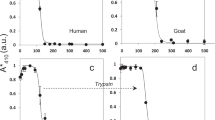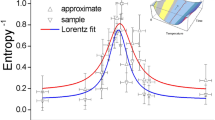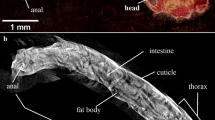Abstract
IN the course of work on osmotic regulation of estuarine invertebrates, it was found that cryoscopic and vapour-pressure methods do not yield reproducible results in a tropical place such as Madras. The potentiometric method outlined here, which is based on the predominance of chloride ions in the blood of animals and in sea water, facilitates a continuous picture of changes in the concentration of the blood of an animal in a given medium and helps us to measure the amount of energy involved.
This is a preview of subscription content, access via your institution
Access options
Subscribe to this journal
Receive 51 print issues and online access
$199.00 per year
only $3.90 per issue
Buy this article
- Purchase on Springer Link
- Instant access to full article PDF
Prices may be subject to local taxes which are calculated during checkout
Similar content being viewed by others
References
Robertson, J. D., “Recent Advances in Invertebrate Physiology” (Univ. of Oregon Publications, 1957).
Panikkar, N. K., and Viswanathan, R., Nature, 161, 138 (1948).
Author information
Authors and Affiliations
Rights and permissions
About this article
Cite this article
GNANAMUTHU, C., RAMACHANDRA REDDY, O. A Potentiometric Method for Observation of Osmotic Behaviour of Prawns. Nature 188, 594–595 (1960). https://doi.org/10.1038/188594a0
Issue Date:
DOI: https://doi.org/10.1038/188594a0
Comments
By submitting a comment you agree to abide by our Terms and Community Guidelines. If you find something abusive or that does not comply with our terms or guidelines please flag it as inappropriate.



